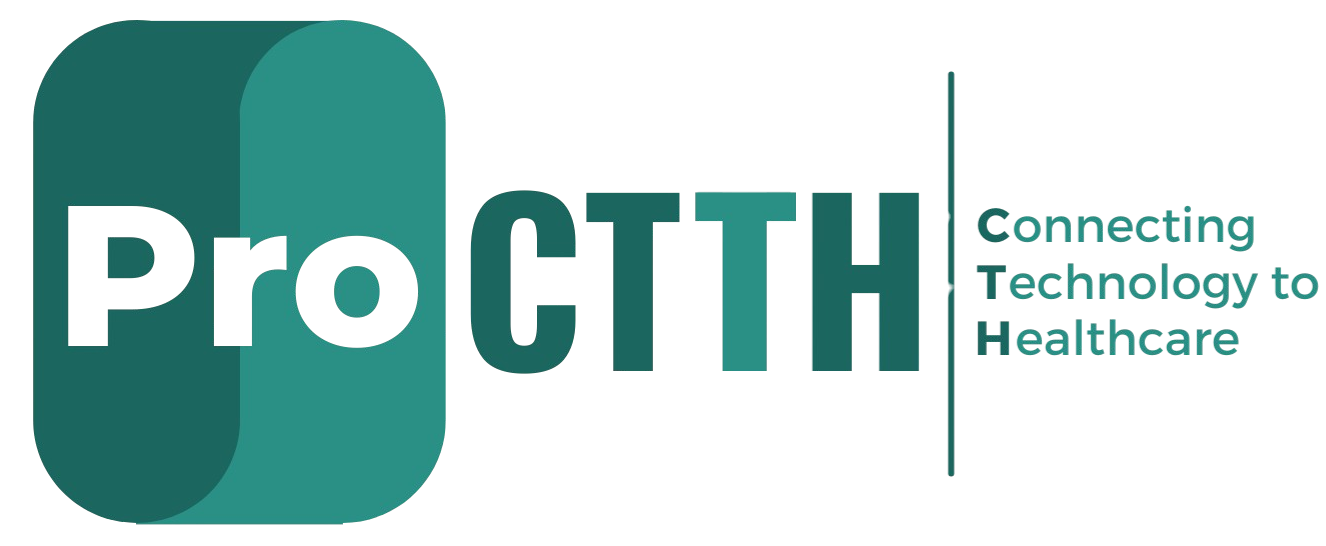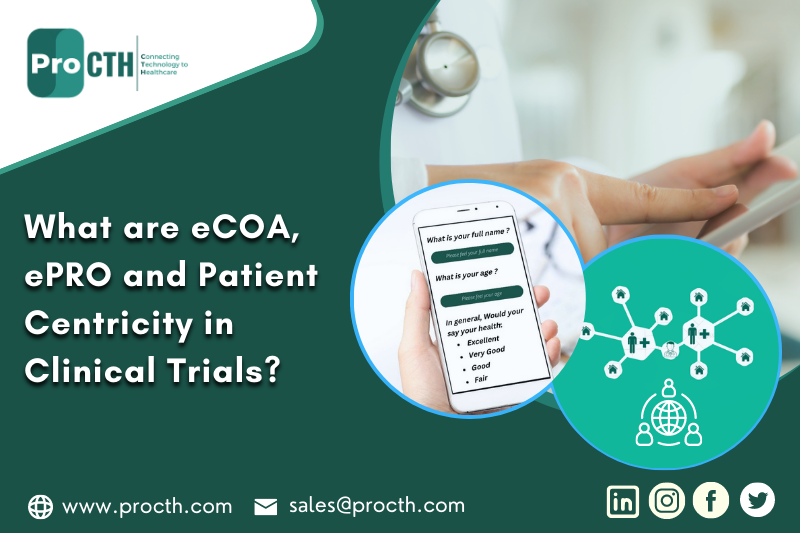eCOA and ePRO refer to electronic methods of collecting patient-reported outcomes and clinical data in clinical trials, respectively. These technologies allow for real-time data collection and improved accuracy, as well as increased patient engagement and convenience. Patient centricity in clinical trials refers to a focus on meeting the needs and preferences of patients throughout the clinical trial process, including study design, patient recruitment, data collection, and communication. This approach can improve patient retention and adherence, as well as lead to better outcomes and overall satisfaction.
Electronic Clinical Outcome Assessments(eCOA) and Electronic Patient-Reported Outcomes(ePRO) are both terms used in the context of clinical trials to refer to the use of electronic devices to collect patient-reported data. eCOA and ePRO aim to improve the accuracy and efficiency of data collection and enhance the quality of the data obtained. Patient-centricity in clinical trials involves placing the patient at the center of the trial process, with the aim of improving patient experience, engagement, and ultimately, the outcomes of the trial. This approach involves actively seeking and incorporating patients’ feedback, needs, and preferences throughout the trial process, making the trial more patient-friendly and ensuring that patients’ voices are heard. These three concepts are crucial in designing and conducting clinical trials that are effective, efficient, and patient-focused.
Introduction: What are eCOA, ePRO & Patient Centricity Clinical Trials?
eCOA Clinical trials (Electronic Clinical Outcome Assessments):
eCOA clinical trials stands for Electronic Clinical Outcome Assessments Clinical Trials. eCOA refers to the use of electronic devices such as smartphones, tablets, or computers to collect patient-reported data during clinical trials. eCOA enables researchers to collect data in real-time, reduce the risk of data errors, and improve the overall quality of data collected. By using eCOA, patients can complete questionnaires or surveys electronically, reducing the need for paper-based forms and improving the efficiency of data collection. It can also enhance patient engagement and adherence to study protocols by providing patients with automated reminders and notifications. Overall, eCOA represents a modern and efficient approach to collecting patient-reported data in clinical trials.
ePRO (Electronic Patient-Reported Outcomes):
ePRO stands for Electronic Patient-Reported Outcomes. ePRO refers to the use of electronic devices such as smartphones, tablets, or computers to collect patient-reported data on their symptoms, quality of life, and other health-related outcomes. ePRO tools are often used in clinical trials to capture patient perspectives on treatment efficacy and safety and to evaluate the impact of interventions on patient outcomes. ePRO allows for real-time data collection and can improve the accuracy and completeness of patient-reported data, also improve patient engagement and adherence to study protocols by providing patients with automated reminders and notifications. Overall, The represents a modern and patient-centric approach to collecting patient-reported data in clinical trials.
Patient Centricity Clinical Trials:
Patient centricity in clinical trials is an approach that places patients at the center of the clinical trial process. Patient-centric clinical trials focus on understanding and addressing the needs, preferences, and priorities of patients throughout the trial lifecycle, from study design to data collection and analysis.
Patient-centric clinical trials aim to improve patient engagement, experience, and outcomes. This approach involves partnering with patients and incorporating their perspectives and feedback into study design, protocol development, and outcome measures. Patient-centric clinical trials may involve the use of innovative technologies such as eCOA, ePRO, as well as patient-centric study designs that minimize patient burden and inconvenience.
Overall, patient-centric clinical trials aim to create a more patient-friendly and efficient clinical trial experience, leading to better outcomes for patients and more successful clinical trials. By prioritizing patient needs and perspectives, patient-centric clinical trials can enhance patient engagement, improve data quality, and accelerate the development of new treatments.
Understanding the Benefits of eCOA, ePRO & Patient Centricity Clinical Trials
There are several benefits of incorporating eCOA, ePRO, and patient-centricity:
-
Enhanced accuracy and efficiency of data collection:
eCOA and ePRO can improve the accuracy and efficiency of data collection by reducing errors associated with manual data entry and allowing for real-time data capture. This can lead to better data quality and more reliable study results.
-
Improved patient experience and engagement:
Patient-centricity involve actively seeking and incorporating patients’ feedback, needs, and preferences throughout the trial process. This can improve patient experience and engagement, leading to better retention and compliance with the study protocol.
-
More meaningful outcomes:
By incorporating patient-reported outcomes, clinical trials can capture data that is more meaningful and relevant to patients. This can lead to the development of treatments that better meet the needs and preferences of patients.
-
Cost savings:
Electronic Clinical Outcome Assessment (eCOA) and Electronic patient-reported outcome (ePRO) can reduce the need for in-person visits, which can result in cost savings for both patients and trial sponsors.
-
Regulatory compliance:
They can help ensure regulatory compliance by providing accurate and reliable data that can be easily audited.
In summary, incorporating eCOA, ePRO, and patient-centricity can lead to improved data quality, patient experience, and more meaningful outcomes. It can also result in cost savings and help ensure regulatory compliance. These benefits make it clear that these concepts are essential in modern clinical trial design.
How to Design an Effective eCOA, ePRO & Patient Centricity Clinical Trial
Clinical trials are at the heart of medical research and development. The success of a clinical trial depends largely on the design and implementation of an effective protocol. A clinical research organization (CRO) plays an important role in designing and managing clinical trials.
Designing an effective clinical trial requires careful planning and attention to several key considerations:
-
Identify the patient population:
Identify the patient population that the trial is designed to serve and ensure that the study protocol reflects their needs and preferences.
-
Select appropriate eCOA and ePRO tools:
Select eCOA and ePRO tools that are appropriate for the patient population and the study objectives. Ensure that the tools are user-friendly and accessible to patients.
-
Define patient-centric endpoints:
Define patient-centric endpoints that capture meaningful outcomes to patients, such as quality of life, symptom relief, and overall satisfaction with treatment.
-
Involve patients in study design:
Involve patients in the study design process by soliciting feedback and incorporating patient preferences and needs into the study protocol.
-
Use a patient-centric approach to informed consent:
Use a patient-centric approach to informed consent that is easy to understand and clearly outlines the study’s goals, risks, and benefits.
-
Consider site selection:
Consider site selection that is convenient for patients and provides access to appropriate healthcare services.
-
Provide support to patients:
Provide support to patients throughout the trial, such as education on the study protocol, access to healthcare professionals, and support for managing study-related symptoms.
-
Use technology to enhance patient experience:
Use technology to enhance the patient experience, such as reminders for study visits or medication administration, and provide patients with user-friendly technology for data collection.
-
Monitor patient engagement and retention:
Monitor patient engagement and retention throughout the trial and make adjustments as necessary to ensure that patients remain engaged and retained in the study.
By carefully considering these factors, study sponsors can design clinical trials that are patient-centric, produce meaningful outcomes that reflect patient needs and preferences.
What Are the Challenges Faced by Companies Implementing eCOA, ePRO & Patient Centricity Clinical Trials?
While the benefits of incorporating clinical trials are clear, there are several challenges that companies may face when implementing these concepts:
1. Technology infrastructure:
Implementing eCOA and ePRO requires a robust technology infrastructure that can support data capture, management, and analysis. Companies may need to invest in new technology or update existing systems to support these requirements.
2. Patient engagement and retention:
Patient-centric clinical trials require active patient engagement and retention throughout the study, which can be challenging. Patients may drop out of the study due to lack of interest or study-related burden, which can impact the study results.
3. Regulatory compliance:
While enhance data accuracy and efficiency, companies must ensure that these tools comply with regulatory requirements. This can involve additional steps in the study design and data management processes.
4. Data privacy and security:
Electronic data capture and storage raise concerns about data privacy and security. Companies must ensure that appropriate measures are in place to protect patient data and maintain data confidentiality.
5.Staff training and support:
The implementation of clinical trials requires staff training and support. Companies must ensure that their staff is properly trained in the use of technology, patient engagement, and data management to ensure the successful implementation of these concepts.
6. Cost:
Implementing clinical trials can involve additional costs related to technology, staff training, and patient support. Companies must carefully weigh the costs and benefits of these concepts before deciding to implement them in a clinical trial.
In summary, while the benefits of eCOA, ePRO, and patient-centricity clinical trials are clear, companies may face several challenges in implementing these concepts in clinical trials. Overcoming these challenges requires careful planning, attention to detail, and ongoing support for patients and study staff.
Conclusion:
In conclusion, eCOA, ePRO, and patient centricity clinical trials are important considerations in clinical trials. By utilizing these approaches, researchers can gather more accurate and meaningful data while also prioritizing the needs and experiences of the patients involved in the study.

